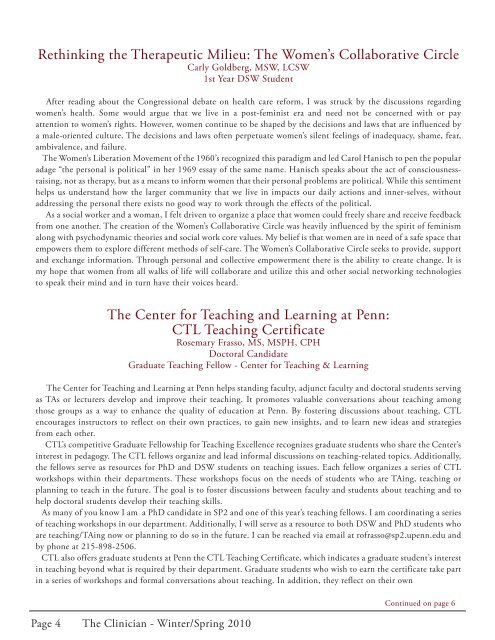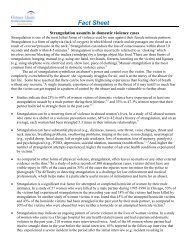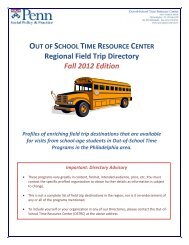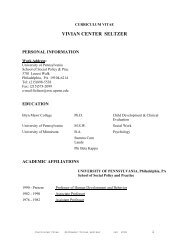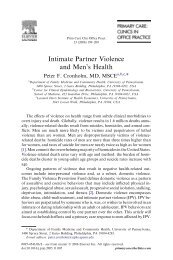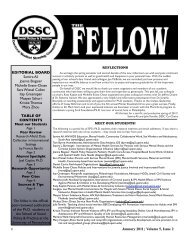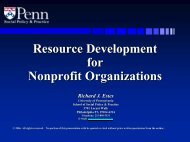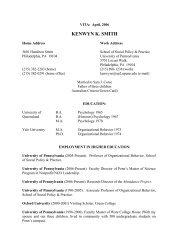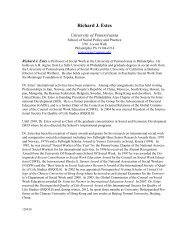Volume Two: Issue One - University of Pennsylvania School of ...
Volume Two: Issue One - University of Pennsylvania School of ...
Volume Two: Issue One - University of Pennsylvania School of ...
You also want an ePaper? Increase the reach of your titles
YUMPU automatically turns print PDFs into web optimized ePapers that Google loves.
Rethinking the Therapeutic Milieu: The Women’s Collaborative Circle<br />
Carly Goldberg, MSW, LCSW<br />
1st Year DSW Student<br />
After reading about the Congressional debate on health care reform, I was struck by the discussions regarding<br />
women’s health. Some would argue that we live in a post-feminist era and need not be concerned with or pay<br />
attention to women’s rights. However, women continue to be shaped by the decisions and laws that are influenced by<br />
a male-oriented culture. The decisions and laws <strong>of</strong>ten perpetuate women’s silent feelings <strong>of</strong> inadequacy, shame, fear,<br />
ambivalence, and failure.<br />
The Women’s Liberation Movement <strong>of</strong> the 1960’s recognized this paradigm and led Carol Hanisch to pen the popular<br />
adage “the personal is political” in her 1969 essay <strong>of</strong> the same name. Hanisch speaks about the act <strong>of</strong> consciousnessraising,<br />
not as therapy, but as a means to inform women that their personal problems are political. While this sentiment<br />
helps us understand how the larger community that we live in impacts our daily actions and inner-selves, without<br />
addressing the personal there exists no good way to work through the effects <strong>of</strong> the political.<br />
As a social worker and a woman, I felt driven to organize a place that women could freely share and receive feedback<br />
from one another. The creation <strong>of</strong> the Women’s Collaborative Circle was heavily influenced by the spirit <strong>of</strong> feminism<br />
along with psychodynamic theories and social work core values. My belief is that women are in need <strong>of</strong> a safe space that<br />
empowers them to explore different methods <strong>of</strong> self-care. The Women’s Collaborative Circle seeks to provide, support<br />
and exchange information. Through personal and collective empowerment there is the ability to create change. It is<br />
my hope that women from all walks <strong>of</strong> life will collaborate and utilize this and other social networking technologies<br />
to speak their mind and in turn have their voices heard.<br />
The Center for Teaching and Learning at Penn:<br />
CTL Teaching Certificate<br />
Rosemary Frasso, MS, MSPH, CPH<br />
Doctoral Candidate<br />
Graduate Teaching Fellow - Center for Teaching & Learning<br />
The Center for Teaching and Learning at Penn helps standing faculty, adjunct faculty and doctoral students serving<br />
as TAs or lecturers develop and improve their teaching. It promotes valuable conversations about teaching among<br />
those groups as a way to enhance the quality <strong>of</strong> education at Penn. By fostering discussions about teaching, CTL<br />
encourages instructors to reflect on their own practices, to gain new insights, and to learn new ideas and strategies<br />
from each other.<br />
CTL’s competitive Graduate Fellowship for Teaching Excellence recognizes graduate students who share the Center’s<br />
interest in pedagogy. The CTL fellows organize and lead informal discussions on teaching-related topics. Additionally,<br />
the fellows serve as resources for PhD and DSW students on teaching issues. Each fellow organizes a series <strong>of</strong> CTL<br />
workshops within their departments. These workshops focus on the needs <strong>of</strong> students who are TAing, teaching or<br />
planning to teach in the future. The goal is to foster discussions between faculty and students about teaching and to<br />
help doctoral students develop their teaching skills.<br />
As many <strong>of</strong> you know I am a PhD candidate in SP2 and one <strong>of</strong> this year’s teaching fellows. I am coordinating a series<br />
<strong>of</strong> teaching workshops in our department. Additionally, I will serve as a resource to both DSW and PhD students who<br />
are teaching/TAing now or planning to do so in the future. I can be reached via email at r<strong>of</strong>rasso@sp2.upenn.edu and<br />
by phone at 215-898-2506.<br />
CTL also <strong>of</strong>fers graduate students at Penn the CTL Teaching Certificate, which indicates a graduate student’s interest<br />
in teaching beyond what is required by their department. Graduate students who wish to earn the certificate take part<br />
in a series <strong>of</strong> workshops and formal conversations about teaching. In addition, they reflect on their own<br />
Page 4 The Clinician - Winter/Spring 2010<br />
Continued on page 6


